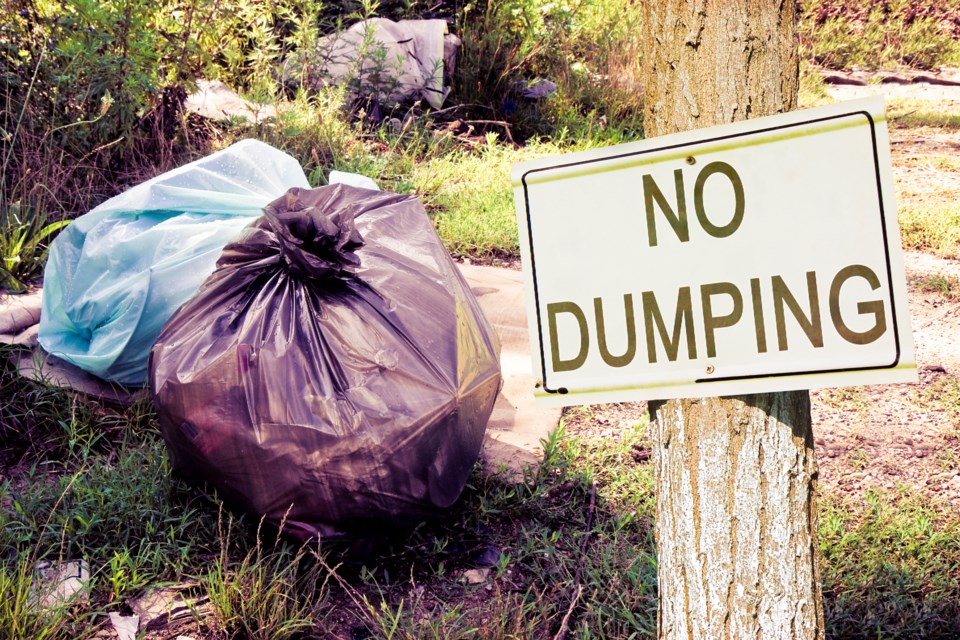I had a genuine devil-on-my-shoulder moment recently.
It happened as I drove away from the kiosk at the Whistler Transfer Station, having just been informed it would cost me $100 to dispose of four on-rim tires—and they were only taking cash, which of course I wasn’t carrying.
Cue the cartoon devil, appearing in a puff of red smoke; he looks just like me, but in a cheap, dollar-store Halloween costume with a plastic, red pitchfork.
“What if you just dumped them in the ditch?” the devil-me says.
“Nobody would know it was you. Why should the greedy bastards at the Resort Municipality of Whistler (RMOW) get more of your money?”
And then, as the classic trope goes, the better half of my conscience materializes as an angel on my other shoulder, assuring me I don’t want to dump four on-rim tires in the ditch.
The thought came and went in an instant, a momentary product of my resentment, and of course I would never dump my tires, or anything, in the ditch.
But as my tires and I drove back to Whistler, I couldn’t help but wonder about all those people who will simply refuse to pay the tipping fee.
Illegal dumping is a challenge for all communities, but Whistler’s demographics and natural environment present unique hurdles to overcome.
“While our transient workforce often have limited access to vehicles, our second homeowners are generally not in the community on weekdays when companies offer pickup schedules,” said an RMOW communications official, in an email. “We have chosen to prioritize wildlife and not have garbage cans left by the curbside on a Sunday for a pickup several days later.”
The RMOW also ensures residents can transport garbage on the bus, and strata properties with more than 12 units are required to have contracted garbage pickup.
But proper waste disposal in Whistler is a growing concern. In 2023, bylaw fielded 112 calls related to solid waste—up from 65 in 2022.
According to the municipality, the goal is to support good decisions.
“We carefully consider tipping fees at the Waste Transfer Station, balancing our need to cover operational costs against the need for affordable fees,” the official said. “These rates are also used to encourage recycling and reduce the amount of waste to landfill, particularly among those who generate large amounts, i.e. construction companies [and] home renovation projects.”
On illegal dumping itself, the municipality takes “an active approach” to enforcement—meaning they’re going to investigate those tires you dumped in the ditch, and if they find out it’s you, “fines are enforced, per our bylaws.”
There are some changes at the Whistler Transfer Station to take note of—one good, and one not so good.
Under the Major Appliance Recycling Roundtable Extended Producer Responsibility (EPR) program, disposing of items like fridges, stoves and microwaves at the transfer station won’t cost you anything, and by 2025, mattresses will be added
to the list as well.
“At the moment, the tipping fee for a mattress is still lower than our disposal cost, to reduce the incidents of illegal dumping,” the RMOW said.
The not-so-good development is in drywall disposal, as the RMOW finds itself searching for a handler of bagged drywall, after the company it previously worked with went out of business.
“For the moment, this means we are accepting new drywall cuttings, clearly date-stamped drywall material and drywall certified asbestos free,” the RMOW said.
“We are not accepting bagged drywall until a suitable alternative can be found. Homeowners must source a transfer station outside of Whistler.”
Not an ideal situation by any stretch, and one that creates prime conditions for illegal drywall dumping—best get those bylaw officers limbered up.
It’s not just a Whistler problem. The Squamish-Lillooet Regional District (SLRD) has struggled with illegal dumping for years, and in 2022 completed an Illegal Dumping Strategy and Action Plan in an attempt to get a handle on the problem.
The report provides valuable insight into the scope of the issue—and how to tackle it.
It found illegal dumping is a problem across B.C., and governments and organizations at every level are trying to address it, but have limited resources.
Materials not covered by the EPR are most commonly dumped; things like mattresses, yard waste, furniture and household garbage.
The report also noted that, with the exception of yard waste, which often isn’t perceived as a risk, those who dump illegally are “aware of their wrong doing.”
Most illegal dumping happens in easily accessible places, not far away from the highway, on roads commonly situated under powerline rights of way, where people are less likely to be seen dumping rubbish.
“People wanted places where there was little chance of being seen dropping off their materials, or there might have been a history of dumping in the area, be it a closed landfill or if it used to be a community waste location,” said consultant Sue Maxwell, in a 2022 presentation to the SLRD board.
“It is also associated with camping or squatting, especially in some northern parts [of the regional district].”
The report also outlined some key strategies: make it easier to dispose properly; make it harder to illegally dump; communicate; partner; facilitate clean-ups; monitor; and enforce.
In the end, I made a second trip to the transfer station, cash in hand, to properly dispose of my tires while making the RMOW just a little bit richer.
I wasn’t happy about that last part. But it felt good to do the right thing.
It might sound like a cliché, but ensuring waste is disposed of properly really is a responsibility we all share.
It comes down to one question: the next time you find a classic moral dilemma playing out on your shoulders, which side of your conscience will you defer to?




